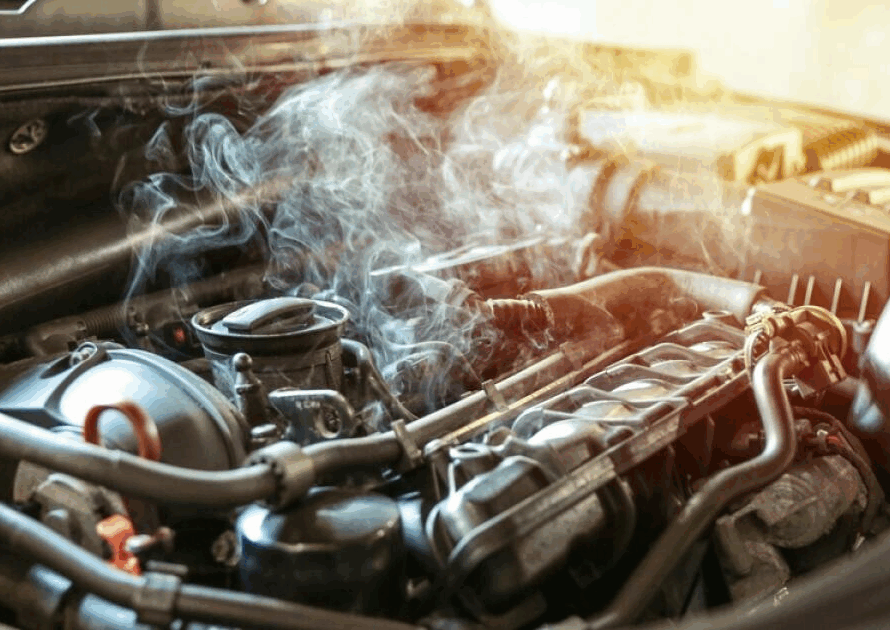A car’s air conditioning (AC) system is essential for keeping you cool during hot weather. It works by circulating refrigerant, which absorbs heat from inside the car and releases it outside. The system consists of several parts, including the compressor, condenser, evaporator, and expansion valve.
If any of these components develop leaks, the AC won’t cool properly. Leaks can occur due to wear and tear, corrosion, or physical damage to the AC parts. When refrigerant escapes, the system loses its cooling ability, leading to warm air blowing from the vents.
Detecting and fixing leaks early can save you from costly repairs. Regular maintenance and inspections help keep the AC running smoothly. Proton Auto Care in Al Quoz 3, Dubai, offers expert AC leak detection and repairs with genuine parts.
Common Signs of an Car AC Leak
One of the first signs of an AC leak is weak or warm airflow. If your car’s AC isn’t as cold as it used to be, there might be a refrigerant leak. Another sign is a hissing sound when the AC is turned on, which indicates escaping gas. Unusual smells, like mold or sweet odors, can also point to leaks.
Oil stains around AC components are another red flag. Refrigerant leaks often leave behind oily residue near hoses, connectors, or the compressor. If you notice frequent AC cycling (turning on and off rapidly), it could mean low refrigerant levels. Ignoring these signs can lead to complete AC failure, so early detection is crucial.
Types of AC Leaks in Cars
AC leaks can occur in different parts of the system. The most common areas include hose connections, O-rings, the condenser, and the evaporator. Hose leaks happen due to cracks or loose fittings, while O-ring leaks occur when the rubber seals degrade over time. The condenser, located at the front of the car, can get damaged by road debris.
The evaporator, hidden inside the dashboard, is prone to corrosion due to moisture buildup. Another possible leak point is the compressor shaft seal, which wears out with age. Refrigerant leaks can also come from the Schrader valves (service ports). Identifying the exact leak location is crucial for an effective repair.
- Common leak locations:
- Hose connections
- O-rings
- Condenser
- Evaporator
- Compressor shaft seal
- Schrader valves
Causes of AC Leaks in Cars
AC leaks can happen for several reasons. The most common cause is worn-out seals and O-rings, which dry out and crack over time. Corrosion in the condenser or evaporator due to moisture exposure can also create leaks. Physical damage from road debris or accidents can puncture AC lines.
Another cause is excessive pressure in the system, which strains hoses and connections. Poor installation of AC components may lead to loose fittings and leaks. Age plays a role too—older cars are more prone to leaks due to deteriorating parts. Regular inspections can help identify weak spots before they turn into major leaks.
You can also learn about How Often Should You Service Your Car in Dubai?
Types of Refrigerants Used in Car AC Systems
Most modern cars use R-134a refrigerant, which is environmentally friendly. Older vehicles may still use R-12 (Freon), which is harmful to the ozone layer and is no longer produced. Some newer models use R-1234yf, a more eco-friendly alternative to R-134a.
Each refrigerant has different pressure levels and requires specific handling. Mixing refrigerants can damage the AC system. Always check your car’s manual to see which refrigerant is recommended. Using the wrong type can lead to poor cooling performance or system failure.
Tools Needed to Detect AC Leaks
Finding an AC leak requires the right tools. A UV dye kit is commonly used—a fluorescent dye is added to the system, and a UV light reveals leaks. An electronic leak detector is another effective tool that senses refrigerant gas.
A pressure gauge helps check refrigerant levels and system pressure. Soapy water solution can also be sprayed on hoses and connections—bubbles form where leaks are present. For professional inspections, nitrogen leak testing is used to detect tiny leaks.
Step-by-Step Guide to Finding AC Leaks
First, inspect visible AC components like hoses, connectors, and the compressor for oil stains. Add UV dye to the refrigerant and run the AC for 10-15 minutes. Use a UV light to check for glowing dye spots, which indicate leaks.
Next, use an electronic leak detector around suspected areas. Listen for hissing sounds, which can help locate leaks. If no leaks are found, a pressure test may be needed. Always wear safety gloves and goggles when handling refrigerant.
How to Fix Minor AC Leaks at Home?
Small leaks in hoses or O-rings can sometimes be fixed at home. For O-ring leaks, turn off the AC, release pressure, and replace the damaged ring. Apply refrigerant oil to the new O-ring before installing it.
For hose leaks, use a sealant designed for AC systems. However, this is a temporary fix—replacing the hose is better. Always recharge the refrigerant after repairs. If unsure, consult a professional to avoid further damage.
When to Seek Professional Help for AC Leaks?
If the leak is in the compressor, condenser, or evaporator, professional repair is needed. These components require specialized tools and expertise. Complex leaks, like those in welded joints, should also be handled by a mechanic.
Persistent leaks after DIY fixes indicate a deeper issue. Mechanics use advanced tools like nitrogen testers and sniffers to find hidden leaks. Delaying repairs can lead to complete AC failure, increasing repair costs.
Cost of Repairing Car AC Leaks in Dubai
Repairing car AC leaks in Dubai can cost anywhere between AED 250 to AED 900, depending on the severity of the leak and the type of vehicle. Minor leaks may just require a sealant or O-ring replacement, while major issues like a damaged condenser or compressor could significantly increase costs.
The hot climate in Dubai makes a properly functioning AC essential, so early detection is crucial. At Protone Auto Care, located in Al Quoz 3, Dubai, expert technicians use advanced tools to diagnose and fix leaks efficiently.
They also offer affordable pricing without compromising on quality service. Timely repairs can prevent bigger expenses and ensure comfortable driving in the UAE heat.

Preventing Future AC Leaks
Regular maintenance is key to preventing leaks. Have your AC system inspected annually, especially before summer. Replace worn-out hoses and seals early to avoid bigger issues.
Keep the condenser clean from dirt and debris. Run the AC for 10 minutes weekly, even in winter, to keep seals lubricated. Avoid overcharging the system with refrigerant, as it increases pressure and strain.
Environmental Impact of AC Refrigerant Leaks
Refrigerant leaks harm the environment by depleting the ozone layer. R-134a contributes to global warming, while R-1234yf is more eco-friendly. Proper disposal of old refrigerant is crucial.
Never release refrigerant into the air. Certified workshops recover and recycle refrigerant safely. Choosing eco-friendly repairs helps reduce environmental damage.
How Often Should You Recharge Your Car’s AC?
A well-maintained AC doesn’t need frequent recharging. If cooling weakens, check for leaks first. Recharging without fixing leaks wastes refrigerant and money.
Most cars need a recharge every 2-3 years. However, if leaks are present, refrigerant will escape faster. Always fix leaks before recharging.
Common Myths About Car AC Leaks
- Myth: Adding more refrigerant fixes leaks.
Fact: Leaks must be repaired first. - Myth: AC systems never need maintenance.
Fact: Regular checks prevent leaks. - Myth: All refrigerants are the same.
Fact: Using the wrong type can damage the system.
Best Practices for AC System Longevity
- Run the AC regularly to keep seals lubricated.
- Clean the condenser to prevent overheating.
- Fix small leaks immediately to avoid major repairs.
- Use only recommended refrigerant types.
How Weather Affects Your Car’s AC System?
Extreme heat increases AC strain, raising the risk of leaks. Cold weather can cause seals to contract and crack. Humidity promotes mold growth in the evaporator.
Parking in shade Improve Car’s AC Performance. Regular use in all seasons keeps the system in good condition.
Choosing the Right Repair Shop for Car AC Fixes
Look for certified technicians with AC repair experience. Check reviews and ask for warranties on parts and labor. Compare prices but avoid cheap, low-quality repairs.
Proton Auto Care in Al Quoz 3, Dubai, offers expert AC leak detection and repairs with genuine parts. Their skilled mechanics ensure long-lasting fixes.
Frequently Asked Questions
How do I know if my car’s AC is leaking?
- Weak or warm airflow
- Hissing sounds
- Oil stains near AC parts
- Unusual smells
Can I drive with an AC leak?
Yes, but the AC won’t cool properly. Continuous leaks can damage the compressor, leading to costly repairs.
How much does it cost to fix an AC leak?
Costs range from $50 for O-rings to $1,000 for compressor repairs, depending on the leak’s location.
Is it safe to use an AC stop-leak sealant?
Temporarily yes, but it can clog the system. Professional repairs are recommended for a permanent fix.
Conclusion
To keep your car’s AC running smoothly, detect leaks early using UV dye or electronic detectors. Fix minor leaks yourself but seek professional help for major issues. Regular maintenance prevents leaks and extends the system’s life.
Always use the correct refrigerant and avoid overcharging. For reliable repairs in Dubai, visit Proton Auto Care in Al Quoz 3, where expert technicians ensure top-quality service. Taking care of your AC system ensures a comfortable and cool ride all year round.


